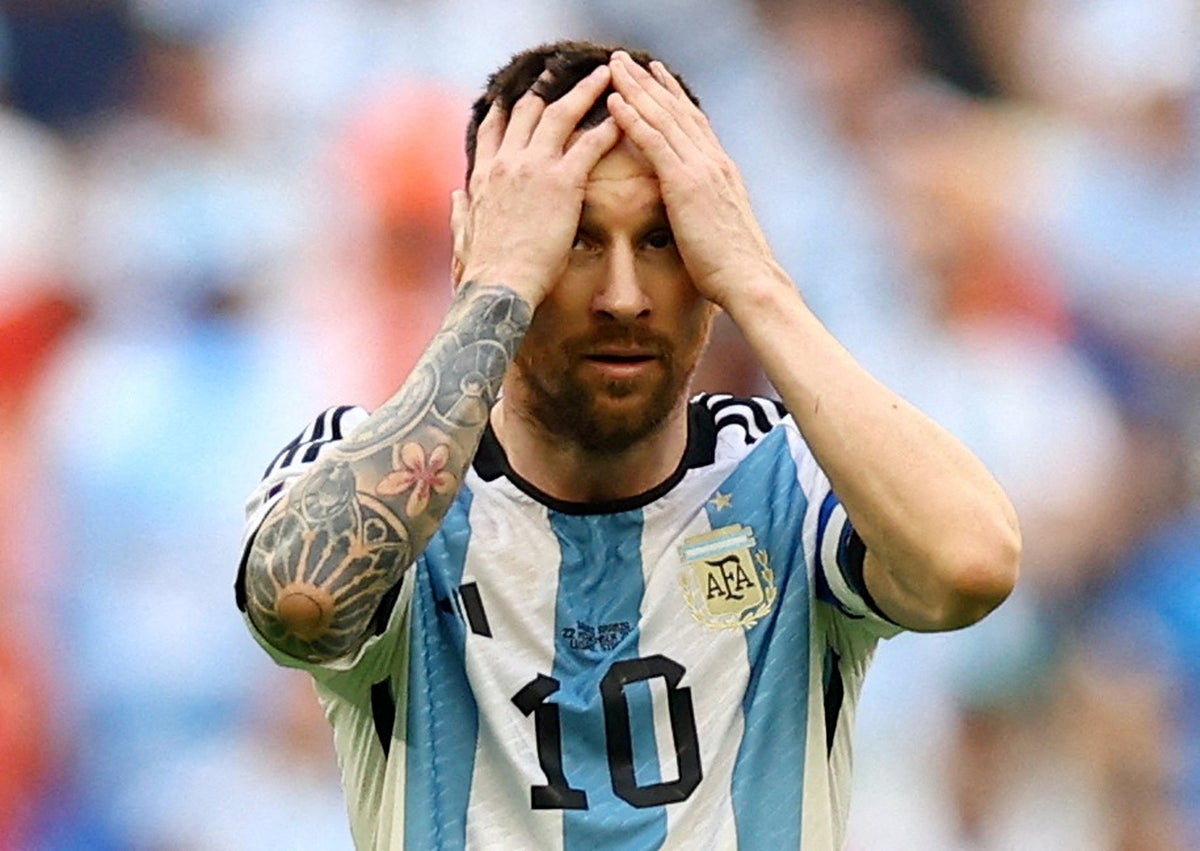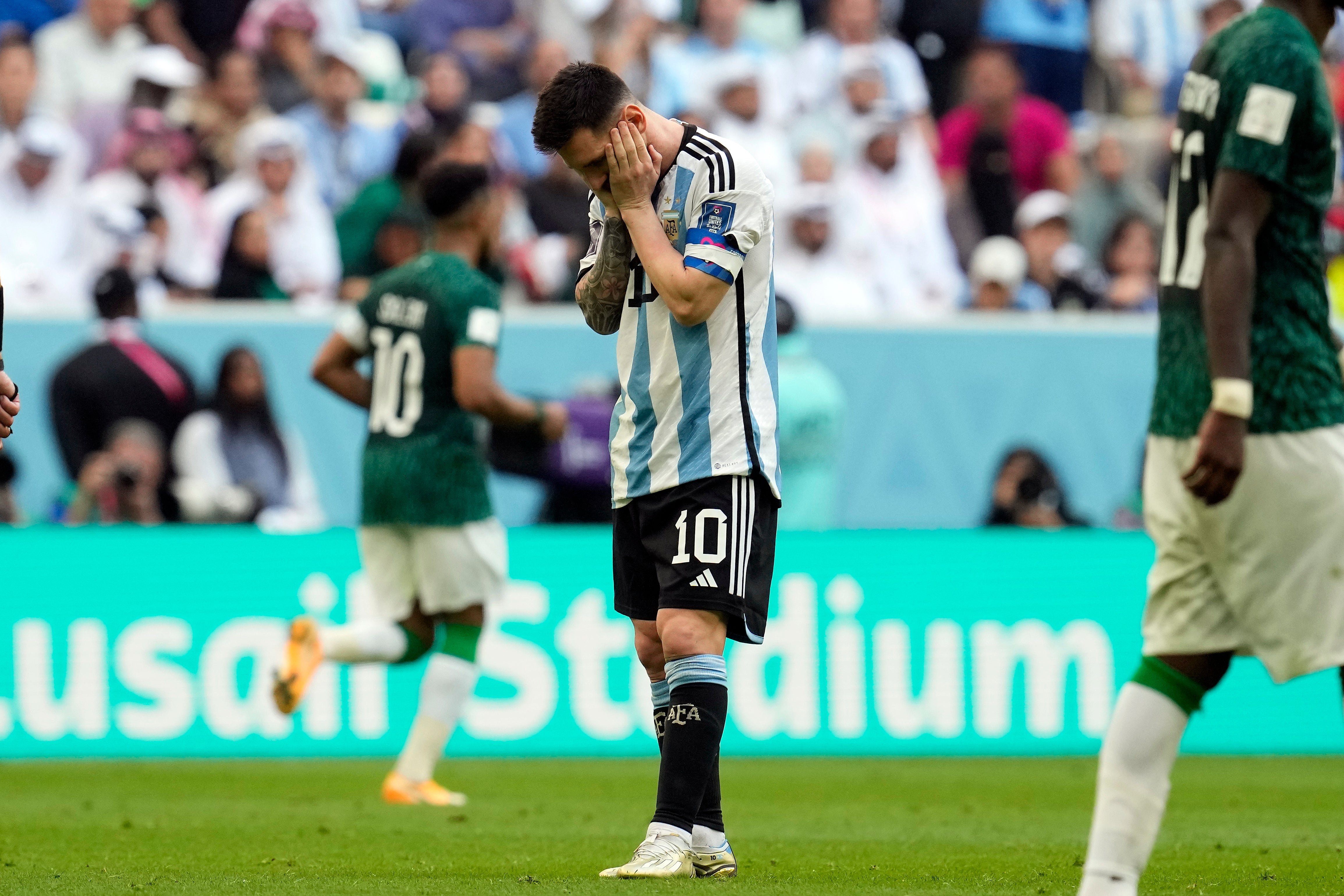
As Lionel Messi walked down for breakfast on the morning after the “nightmare” before, he immediately realised the Argentina squad needed rallying. The captain had told them they had to “turn the page” on the shock defeat to Saudi Arabia, but felt a bit more had to be done to change the atmosphere.
It was decided to open up their Qatar University camp and let the players’ families. They stayed for over five hours, and it was said to be “great for the team”.
There was already a considerable difference from 24 hours before, when the dressing room was described by numerous figures as “a horror”.
If this all seems like an old-fashioned overemphasis on the psychology of the Argentina squad, it is because it remains a very present problem. They have probably been the national team most affected by mood than any other in the last decade. When things are going well, as they were throughout that 36-match run, the team can be electric; flying. When there’s a setback, as started with that first offside against Saudi Arabia, it gets to them.
It is telling that they were never once behind in that long run. It is even more telling that, once Salem Aldawsari scored for Saudi Arabia to go ahead, Argentina barely mustered a chance.
Now, after a first defeat in 37 games, it might as well be as if they never went on that run at all.
If the Saudi result shocked the world, many in the Argentine squad remain utterly stunned.
Some describe an “emotional detonation”. There was a sense of “grief” among the players. There were suddenly new doubts.
Theories were raised in some circles about whether it was relevant that the 2021 Copa America victory - a first international trophy in 28 years - came without crowds. Lionel Scaloni, who had been hailed as a serendipitously good choice, is now being questioned over whether he has the man-management capability to deal with a crisis.
He has tried his best to relax people, to be fair. On returning to the camp after the Saudi Arabia game, Scaloni told the squad they didn’t have to have dinner together. They could stay in their rooms if they felt like it.
He also spent much of Thursday afternoon with his staff poring over analytical data and videos in preparation for “a final” against Mexico. The team is likely to change.
That prospect is almost a concern in itself in some ways. It’s possible Scaloni’s big idea, over such a long run of form may not even survive one World Cup game.
It was nevertheless inescapable how little control Argentina had in the Saudi Arabia game. That was alarming. They just didn’t seem able to handle the Saudi side’s relentless pressing, and Leandro Paredes was left trying to man midfield himself. That resulted in a lot of panicked clearances and rushed balls over the top.
It’s all the more remarkable given this is a side that has Messi. He was once more on the fringes of a game, though, because Argentina were just trying to fashion something out of nothing. There was no construction to their play.
Scaloni may instead rebuild the team, especially in midfield.

Among the considerations are Enzo Fernandez and Alexis MacAllister in the centre, with Marcos Acuna coming in for Nicolas Tagliafico on the left and Gonzalo Montiel for Nahuel Molina. Lisandro Martinez is almost certain to replace Cristian Romero in central defence. The Tottenham Hotspur centre-half is meant to be “fed up” over his fitness.
The hope is that any reconfiguration revitalises the team, but they did look a little fatigued, even compared to under-performing European sides.
Saudi Arabia were beating them to so many runs and challenges. They sensed Argentina were there for the taking. It was that subtle psychological shift that happens in such games.
It would still take a historical shift for something similar to happen against Mexico. This is why this next match, which could decide their future in the World Cup and Messi's tournament legacy, might be ideal.
If the competition has this rare psychological hold over Argentina, Mexico are a rare side who have a psychological complex about Argentina.
Messi was in the squads that eliminated Mexico in both 2006 and 2010, and this side doesn’t look as accomplished as either of those.
This is what Scaloni and his staff have been focusing on: various weak points in Gerardo Martino’s team.
Messi knows a Martino team well, too. He played under him for Barcelona in 2013-14, and then in Argentina’s run to the Copa America final in 2015.
They were rigid sides, who could be difficult to open, but weren’t exactly expansive. And Martino now has far inferior players.
Argentina know that too, even amidst the doubts. There was a notable change in mood after the families left at around 8pm Qatar time on Wednesday.
The players started to talk about how it was better that defeat happened in the first game. Messi has been repeating another line, reflecting his evolution as a leader who is now very vocal.
“The World Cup starts now.”
It needs to, or this could actually be over before it ever begins.







